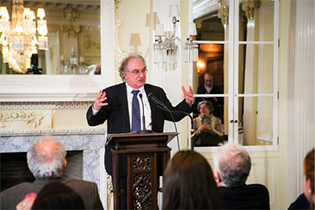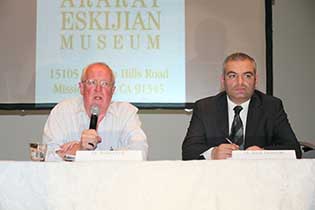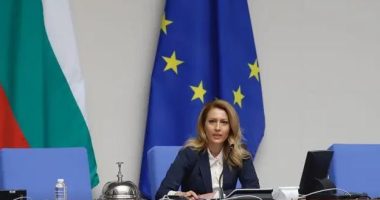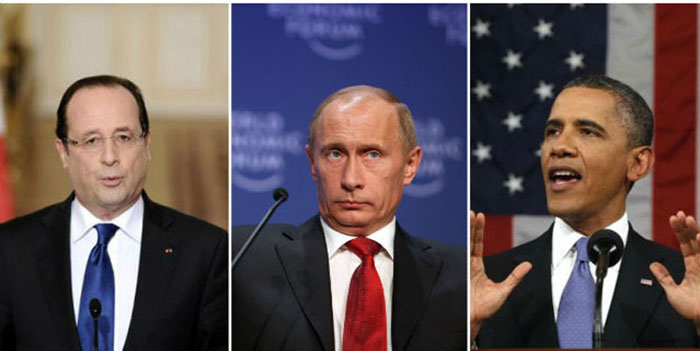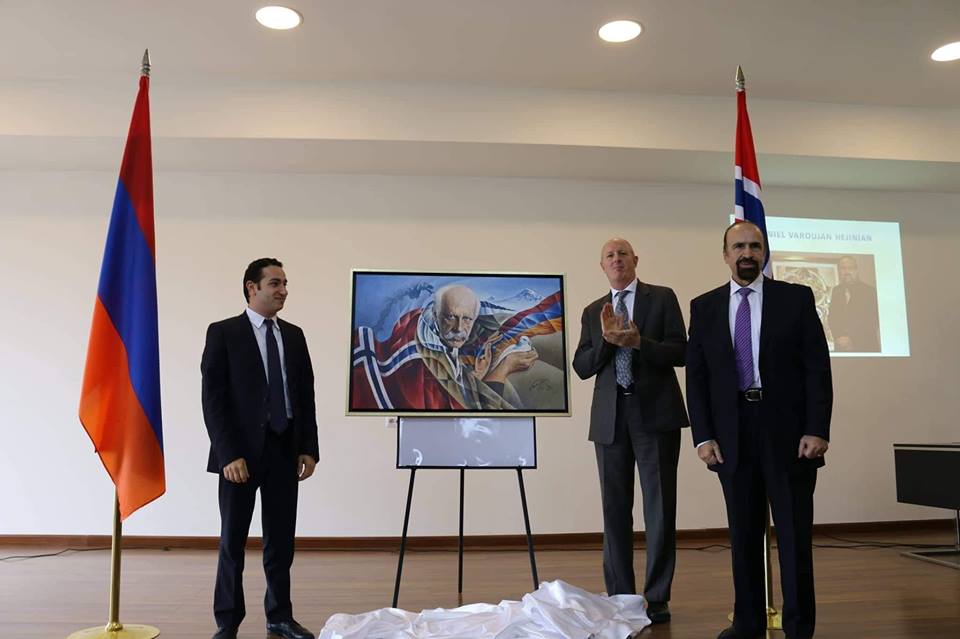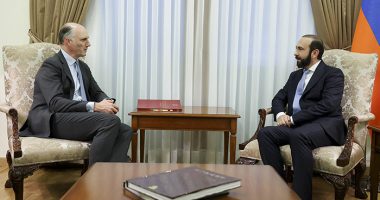Report written by Sarah Newell, Boston University, History & Economics, ’15
and Ivy Tran, Boston University, Psychology & History, ’16


BOSTON, MA — On Wednesday evening, March 26, 2014, Rouben Shougarian and Armen Baibourtian, former ambassadors of post-Soviet Armenia, spoke at the Kenosian Chair Current Issues Series, “The United Nations Armenia, and the Sovereignty of Nagorno Karabagh,” at Boston University’s Castle.
Professor Simon Payaslian, Charles K. and Elisabeth M. Kenosian Chair in Modern Armenian History and Literature at Boston University, invited these prominent figures in Armenian diplomacy to participate in the event, which was co-sponsored by the departments of History and International Relations at Boston University, as well as the National Association for Armenian Studies and Research (Belmont, MA). The speakers discussed the role of the United Nations in Armenia, Armenia’s foreign policy, and national sovereignty issues in the Nagorno Karabagh conflict, and related them to the current Crimean crisis.
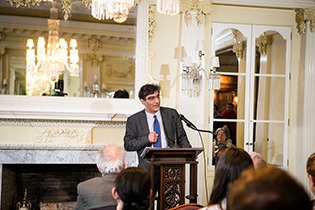

The first speaker, Ambassador Shougarian served as Armenia’s first Ambassador to the United States (1993-1999), Deputy Foreign Minister (1999-2005), and Ambassador to Italy, Spain and Portugal (2005-2008). He also worked for the Armenian Parliament’s Standing Committee on Foreign Affairs and acted as a senior foreign policy aide and spokesperson for President Levon Ter-Petrossyan. Holding an MA with honors from Yerevan Linguistic University, Ambassador Shougarian currently lectures at Tufts University’s Fletcher School of Law and Diplomacy. Mr. Shougarian is the author of two books: “West of Eden, East of the Chessboard” (2010) and “The Politics of Immaculate Misconception: The Ides of the Post-Secular Age” (2013), in addition to numerous articles addressing conflict resolution and the Black Sea region’s geopolitical identity.
Ambassador Shougarian began his speech by recognizing how “the last decade brought about tectonic geopolitical changes” for the region of Nagorno Karabagh and the impact of these changes on issues pertaining to national sovereignty. He went on to say that the region’s sovereignty, including definitions of border security and administration, as well as dealing with people displaced by regional conflicts, intertwine with problems facing other former Soviet territories. Further, Shougarian linked these problems to the current crisis in Crimea.
“The concept [of sovereignty] has to be redefined,” Shougarian stated. The issue requires rethinking the philosophy and changing our mindsets. The current definition of sovereignty, he argued, implies autonomy, but “no nation is autonomous.” Countries always depend on one another for support and security.
Sovereignty as it exists now is “as useless as a unicycle, one can ride on it, but not well,” the Ambassador remarked. Therefore, we must rethink this definition in order to avoid double standards and to stop measuring ethno-territorial conflicts with the same yardstick. Instead, the international community should adopt the idea of what Shougarian called “remedial sovereignty,” which he defined in four ways: sovereignty yielded by the center to peripherals, sovereignty granted by an international body to an ethno-territorial unit, sovereignty earned and defended by the region itself, and sovereignty claimed by an intervening outside party.
Shougarian also acknowledged that a region’s sovereignty must first be achieved, granted, or recognized in order to be remedied, an observation that certainly applies to the current Crimean crisis.
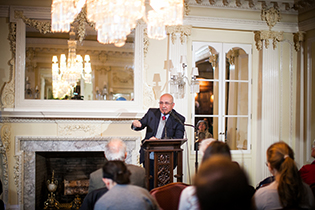

Ambassador Armen Baibourtian spoke next, expanding on the evening’s theme of national sovereignty. With PhDs in International Studies and Modern World History, Dr. Baibourtian currently teaches at the University of Massachusetts in Amherst. He previously served as Senior Adviser to the UN Resident Coordinator in Armenia where he developed and coordinated the UNDP “Global Armenia” program. Baibourtian also acted as Deputy Foreign Minister of Armenia (1997-2000 and 2004-2008) and Armenia’s Chief Negotiator with the European Union (2005-2006). His served as the first Armenian Ambassador to India, Nepal, Sri Lanka and Indonesia (2000-2004) as well as Armenia’s first Consul General in Los Angeles (1995-1997), Deputy Permanent Representative of Armenia to the United Nations, and Foreign Policy Advisor to the Speaker of the Armenian Parliament (1991-1992).
“The UN is important to Armenia not because of its scale or magnitude, but for its targeted policies, its partnership in large projects, and its donor coordination,” Ambassador Baibourtian argued. He asserted that although the United Nations contributed only $72 million to Armenia, a relatively small amount, the UN’s “essence” makes it vital to Armenia.
What is this “essence”? Describing the UN as one of the “best practices in the existing world,” the diplomat offered examples of the UN’s aid in Armenia. The organization, he said, works with the Armenian government to help college graduates find employment, develop proper long-term budgeting and to implement modern, secure border management. Further, Baibourtian held that “the principle of the UN in Armenia is not just cooperation, but partnership” in solving issues like border disputes and trade pathways with neighboring Georgia.
However, according to Baibourtian, Nagorno Karabagh has not been as fortunate as Armenia. Without consent of Azerbaijan, the UN cannot establish an international presence in the territory. He stressed that while NGOs work to build trust and keep peace in Nagorno Karabagh, the dispute remains one of the world’s “most dangerous conflicts.” One of the “important things that the UN supports in international communities is the peaceful resolution of the Nagorno Karabagh problem,” he said.
This conflict evokes two major and contending principles of international law: self-determination and territorial integrity. While this tension manifests itself in Nagorno Karabagh as Armenia evokes self-determination and Azerbaijan cites the principle of territorial integrity, Baibourtian reminded his audience that this ideological collision occurs repeatedly throughout history.
But can these historical examples lead to a resolution for Nagorno Karabagh? “No, precedent is not binding,” Dr. Baibourtian noted. As a result, “it cannot serve as a precedent in other situations.” Instead, the international approach must be case-by-case, though he added that the Armenian solution is one including unilateral steps to work through the problem.
In the question and answer session, Professor Payaslian addressed one of these difficult cases, asking what the long-term implications of the Crimean crisis would be for Armenia. Mr. Shougarian answered that in the worst-case scenario, the Organization for Security and Co-operation in Europe (OSCE) would cease to exist, which, he warned, “should never be allowed to happen.” More positively, a successful resolution could set an example of self-determination reached by national referendum for Nagorno Karabagh.
Either way, the situation is a “double edged sword,” according to Ambassador Shougarian. While it could inspire self determination, it could also give Azerbaijan a “green light” to use force in Nagorno Karabagh as Russia did in Crimea.
In response to an inquiry about why Armenia is choosing inaction while Azerbaijan builds up its military, Ambassador Baibourtian explained that there are two considerations that must be taken into account. First, the external security arrangement dimension and what interactions between the two countries would mean in relation to the UN code. Second, the internal defense buildup that requires economic preparation, a factor that also conditions the security of Nagorno Karabagh.
During the catered reception following the audience questions, a Boston University graduate student described the event as a “good, informative presentation that touched on crucial issues.”
For more information about the Kenosian Chair Current Issues Series and the discussion on “The United Nations Armenia, and the Sovereignty of Nagorno Karabagh,” contact Professor Payaslian at [email protected].

